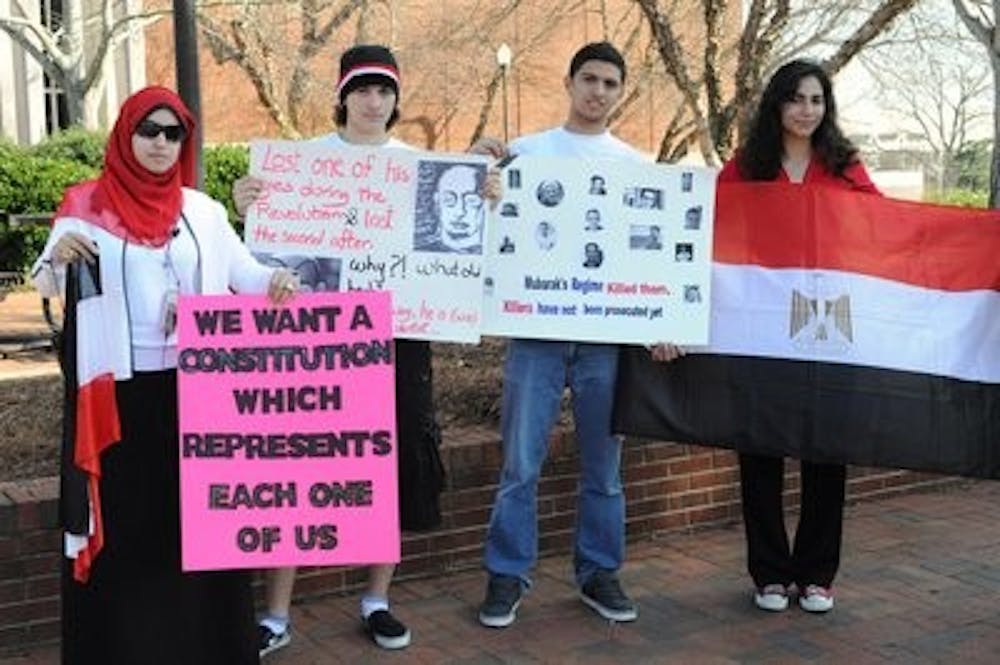Waving their nation's flag and displaying signs and banners, Egyptian students and community members gathered in front of Ralph Brown Draughon Library Jan. 25 to mark the anniversary of their nation's revolution.
They were showing support support for the thousands once again protesting in Cairo's Tahrir Square, a year after Egyptians took to the streets calling on their president, Hosni Mubarak, to step down.
"(Mubarak) was a military dictator," said Azeem Ahmed, junior in finance and economics. "For 30 years he ruled under emergency law. He effectively ran a police state. A lot of people would go missing. There was a lot of police brutality."
Ahmed witnessed the discontent and protests that persisted when he arrived in Egypt as an intern with the United Nations World Food Programme in May, after Mubarak's departure.
"The military council runs the country right now, and they are the ones in charge of making sure the country transitions into a democracy," Ahmed said. "But they are the military, and the military's run the country since they gained independence in the 1920s. There is a lot of apprehension amongst people as to whether the military will actually hand over power."
Made worse by continued police brutality, the uncertainty of the situation has helped keep the revolution alive.
"After almost one year since those unforgettable, historical days of the Egyptian revolution, the status quo in Egypt is worsening," said Sawsan Gharib, an Egyptian-American political activist.
"The post-revolution rulers of Egypt are still enforcing emergency law, detaining innocent people without trial, subjecting civilians to military courts, killing protesters, using prohibited weapons against peaceful protesters, kidnapping revolutionists, defaming revolutionists using state-owned media and torturing, targeting and sexually insulting women."
In response, Egyptians used the anniversary to revive their calls for democratic representation.
"They decided that the revolution must continue until the complete and genuine achievement of all of the revolution's goals," Gharib said. "Egyptians decided to stand up peacefully again for their rights and for their stolen dream of a democratic state."
Gharib helped organize Global Days, in which every state and major city in the country organized a protest during the week of the anniversary to show support for the protestors abroad.
"(The U.S. protests) have been very beneficial," Gharib said. "Awareness is raised. We sent a strong message to the Supreme Council of Armed Forces that is ruling and a stronger message to the revolution in Tahrir that we are all united behind them."
Yasser Gowayed, an Egyptian-American and professor of polymer and fiber engineering, was unable to attend last week's protest, but said his wife attended.
"I would say most Auburn Egyptians are supporting the revolution and are against SCAF," Gowayed said. "There are some people that did not go because they believe the military is hijacking the revolution, and they don't see a reason to celebrate until it's completely over. They are looking to continue the revolution until the military is out of the picture. There are also some who did not go to the protest because they want to give SCAF a chance to finish its job until June."
During Ahmed's time in Egypt, he was informed of protests via U.S. Embassy advisories, which he ignored, instead choosing to make his way to the hot spots to converse with the protestors.
"A protestor came up to me and told me, 'We're human too. We have the exact same needs and wants and everything as you guys do. Just like you have democracy in your country, we want it in ours. We want to bring it to our own country like you brought it to your own,'" Ahmed said.
Though slow, progress has been made in the past year.
"The progress has been removing Hosni Mubarak," said William Malczycki, Islamic history specialist in the history department. "People wanted change right away, and they didn't get it with SCAF. One has to keep in mind, (Mubarak) was there for 30 years, and it's not going to happen overnight."
Still, the country is taking steps toward securing a democratic government.
"This time last year they had a military dictator that had been in power for 30 years," Ahmed said. "Now they've already had almost all their rounds of parliamentary elections, and in a couple months they'll have presidential elections.
"As far as the international monitors have seen, the elections have not been rigged. A record amount of Egyptians have turned out to vote. People are doing their part.
"The government, so far, seems to be doing their part. They're on the road to a peaceful, democratic transition."
Do you like this story? The Plainsman doesn't accept money from tuition or student fees, and we don't charge a subscription fee. But you can donate to support The Plainsman.





